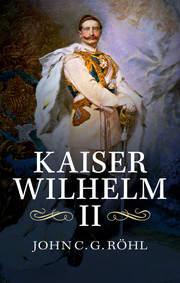Book contents
- Frontmatter
- Dedication
- Contents
- List of figures
- Acknowledgements
- Preface to the English edition
- Preface to the German edition
- Acknowledgements
- Overview: Wilhelm the Last, a German trauma
- Part I 1859–1888: The Tormented Prussian Prince
- Part II 1888–1909: The Anachronistic Autocrat
- Part III 1896–1908: The Egregious Expansionist
- Part IV 1906–1909: The Scandal-Ridden Sovereign
- Part V 1908–1914: The Bellicose Supreme War Lord
- 17 The Bosnian annexation crisis (1908–1909)
- 18 The ‘leap of the Panther’ to Agadir (1911)
- 19 The battlefleet and the growing risk of war with Britain (1911–1912)
- 20 Doomed to failure: the Haldane Mission (1912)
- 21 Turmoil in the Balkans and a first decision for war (November 1912)
- 22 War postponed: the ‘war council’ of 8 December 1912
- 23 The postponed war draws nearer (1913–1914)
- 24 The Kaiser in the July crisis of 1914
- Part VI 1914–1918: The Champion of God’s Germanic Cause
- Part VII 1918–1941: The Vengeful Exile
- Notes
- Index
24 - The Kaiser in the July crisis of 1914
Published online by Cambridge University Press: 05 September 2014
- Frontmatter
- Dedication
- Contents
- List of figures
- Acknowledgements
- Preface to the English edition
- Preface to the German edition
- Acknowledgements
- Overview: Wilhelm the Last, a German trauma
- Part I 1859–1888: The Tormented Prussian Prince
- Part II 1888–1909: The Anachronistic Autocrat
- Part III 1896–1908: The Egregious Expansionist
- Part IV 1906–1909: The Scandal-Ridden Sovereign
- Part V 1908–1914: The Bellicose Supreme War Lord
- 17 The Bosnian annexation crisis (1908–1909)
- 18 The ‘leap of the Panther’ to Agadir (1911)
- 19 The battlefleet and the growing risk of war with Britain (1911–1912)
- 20 Doomed to failure: the Haldane Mission (1912)
- 21 Turmoil in the Balkans and a first decision for war (November 1912)
- 22 War postponed: the ‘war council’ of 8 December 1912
- 23 The postponed war draws nearer (1913–1914)
- 24 The Kaiser in the July crisis of 1914
- Part VI 1914–1918: The Champion of God’s Germanic Cause
- Part VII 1918–1941: The Vengeful Exile
- Notes
- Index
Summary
Three weeks before the assassination of Archduke Franz Ferdinand in Sarajevo on 28 June 1914 Kaiser Wilhelm II had prophesied: ‘We shall soon be coming to the 3rd chapter of the Balkan Wars, in which we shall all be taking part.’ Exactly as in November 1912, when the German decision for war was taken the first time, the monarch now ordered the Reich leadership to ‘clarify the position in relation to England!’. Accordingly, Bethmann Hollweg once again addressed the crucial question to Prince Lichnowsky in London on 16 June – two weeks before the Sarajevo assassination: how would Britain behave in the event that ‘any sort of clash of interests, even quite a minor one, between Russia and Austria-Hungary’ should ‘ignite the torch of war’? That very day the quartermaster general on the German General Staff, Georg Count von Waldersee, who, like Moltke, had very recently spoken out in favour of bringing about a war against France and Russia while the going was good, summoned the military representatives of the three non-Prussian kingdoms – Bavaria, Württemberg and Saxony – and asked them not to send any written reports to their ministers of war until further notice; officers of the General Staff, he added, were on their way to Munich, Stuttgart and Dresden to explain the need for silence. In line with this, in late May 1914 Moltke asked Gottlieb von Jagow, the Secretary of State for foreign affairs, ‘to conduct our policy with a view to bringing about an early war’. Thus there are indications that the leadership of the Reich – that is to say, about twenty military officers and the civilian statesmen Bethmann Hollweg, Jagow and undersecretary Arthur Zimmermann – had already decided in favour of war with France and Russia before the atrocity at Sarajevo took place.
- Type
- Chapter
- Information
- Kaiser Wilhelm IIA Concise Life, pp. 149 - 164Publisher: Cambridge University PressPrint publication year: 2014



